-
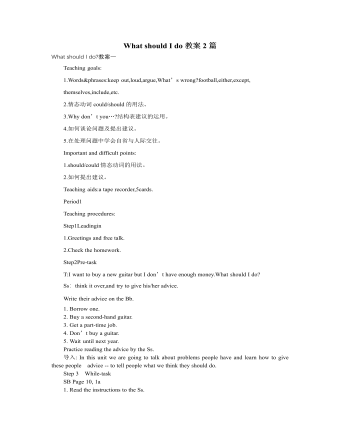
人教版新目标初中英语八年级下册What should I do教案2篇
说明:在帮Li Lei提建议的同时,教育学生如何学好英语。第三课时教学目标1. 语言目标:a) 词汇: Original, in style, haircut, the same as.b) 语言结构:My friend wears the same clothes and has the same haircut as I do.2. 能力目标:大多数学生能够谈论自己喜欢哪种服装,提高查找信息的能力。3. 情感目标:学会如何与朋友相处,要有自己对时尚的看法。教学重点掌握一些重要词汇。教学难点学会谈论问题,并能提出书面建议。◆教学突破首先针对Erin的问题,提出个人的建议,模仿2c部分的对话展开双人交际Pair-work;听老师诵读3a部分的信件,并找出LEFT OUT的问题所在;学生完成3b部分的内容,给Left Out提出书面的建议;学以口头形式提出自己目前存在的某个问题,讲给大家听,让同学们给自己提出一个建议,并作笔录;学生两、三个人分成一组,随意性地进行口语交际,谈论P14的第4部分的某个问题,相互交换意见。
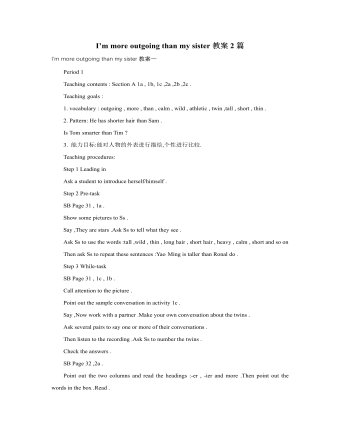
人教版新目标初中英语八年级上册I’m more outgoing than my sister教案2篇
1 交通工具的比较此活动为小组活动。学生通过讨论找出到达某一城市可乘坐的各种交通工具,并选择最佳出行方式。Teacher:We’re going to Shanghai. How many ways can we use to get there? Yes, there are four ways: by bus, by plane, by train, by ship. Please discuss how you are going to get there.操作建议:(1)学生以小组为单位展开活动,谈论本组所选择的交通工具。(2)各组选代表向全班汇报,阐述本组所选择的交通工具的利和弊。完成任务所需要的语言结构:We can go there by ship. It’s more comfortable and cheaper than any other transportation.We can go there by bus. It’s cheaper but it takes longer time.2 哪个城市更合适?此活动具有挑战性。假设中国要举行2014年世界杯足球赛,分别从历史,人文,天气等方面对各城市(北京,大连,上海,昆明)进行比较,选择最佳举办城市。T: Imagine China is holding the 2014 FIFA World Cup. Which city do you think is the best for the World Cup, Beijing, Dalian, Shanghai or Kunming? Let’s work in groups. If you choose Beijing, please join the Team Red. If you chose Dalian, please join the Team White. If you choose Shanghai, please join the Team Blue. If you choose Kunming, please join the Team Green. Please show us its advantages. Then let’s see which team will win.
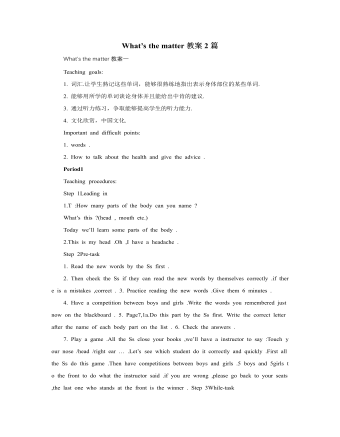
人教版新目标初中英语八年级上册What’s the matter教案2篇
She shouldn’t go to the party tonight.Step7. TaskT: You know, there are lots of problems in our life. If you are a doctor, please tell us how to solve the problem. I will divide you into 9 groups. Please work in groups. And then choose one of you to report your ideas.The following are the problems:I have a toothache.I am hungry. I have a sore throat.I am stressed out. I have a sore back.I am tired. I can’t sleep.I have a cold. I have a headache.Report: If you have a headache, you should go to bed early. You should see the doctor. You should eat some medicine. You shouldn’t wash your face with cold water.You shouldn’t sleep late.You shouldn’t swim.…..T encourages the students to give advice as much as possible.Homework:1. Chose one of the problems, and write down your advice2. Copy the new words这一步是用于热身的,同时也可以让他们复习一部分的表示人体部位的单词,扩充知识.学习语言的过程也是一个不断积累的过程,复习旧知识,增添新知识.通过小游戏,强化学生对Does she/he have…这个句子的运用能力.通过复习,自然的引到下面新知识的学习。充分利用表格,由句子到对话,再到文章,让学生循序渐进. 提高学生的综合语言运用能力,运用以前学过的知识来解决身边的问题.Period 5 (Section B 3a—3c, selfcheck)教学内容与分析:
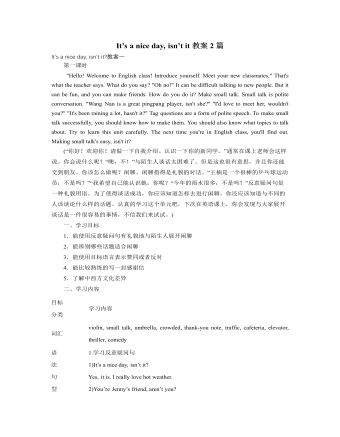
人教版新目标初中英语八年级下册It’s a nice day, isn’t it教案2篇
"Hello! Welcome to English class! Introduce yourself. Meet your new classmates." That's what the teacher says. What do you say? "Oh no!" It can be difficult talking to new people. But it can be fun, and you can make friends. How do you do it? Make small talk. Small talk is polite conversation. "Wang Nan is a great pingpang player, isn't she?" "I'd love to meet her, wouldn't you?" "It's been raining a lot, hasn't it?" Tag questions are a form of polite speech. To make small talk successfully, you should know how to make them. You should also know what topics to talk about. Try to learn this unit carefully. The next time you're in English class, you'll find out. Making small talk's easy, isn't it? (“你好!欢迎你!请做一下自我介绍。认识一下你的新同学。”通常在课上老师会这样说。你会说什么呢?“噢,不!”与陌生人谈话太困难了。但是这也很有意思,并且你还能交到朋友。你该怎么做呢?闲聊。闲聊指得是礼貌的对话。“王楠是一个很棒的乒乓球运动员,不是吗?”“我希望自己能认识她,你呢?“今年的雨水很多,不是吗?”反意疑问句是一种礼貌用语。为了使得谈话成功,你应该知道怎样去进行闲聊。你还应该知道与不同的人该谈论什么样的话题。认真的学习这个单元吧,下次在英语课上,你会发现与大家展开谈话是一件很容易的事情,不信我们来试试。)
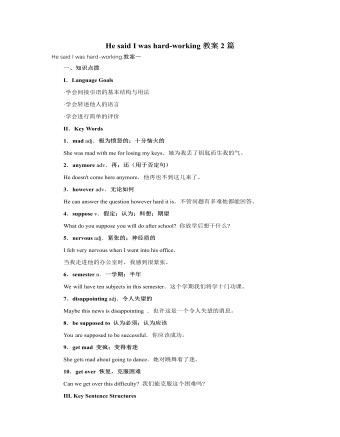
人教版新目标初中英语八年级下册He said I was hard-working教案2篇
This activity introduces some new vocabulary and provide oral practice using the target language.Task 1 . Ask four students to stand in front of the class, and the teacher asks them the following questions as a reporter.1.What are you going to do when you grow up?2.What are you going to do next week?3.What are going to do after school?The students will give different answers, then ask a good student to report what they said.I am going to e a doctor.What did she say?----------She said she was going to be a doctor.I am going to have a party on Friday night.What did he say?-------He said he was going to have a party on Friday night.I am going to do my homework.What did she say ?------ She said she was going to do her homework.I am going home after school.What did she say?-----She said she was going home after school.Say In this unit we are going to learn to use words like to report what someone said.Task 2. Read the instructions. Then ask a student to read the four questions. And write the words on the Bb. Explain what soap opera is.Task 3. Ask the students to Look at the pictures, point out the TV screens in the picture. Ask one girl to read what Marcia said.What did Marcia say? She said She said she was having a surprise party for Lana on Friday night. Repeat the other pictures in the same way.Activity3. Listen and number the pictures in activity 1a.
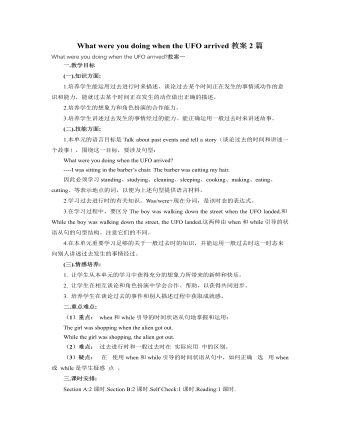
人教版新目标初中英语八年级下册What were you doing when the UFO arrived教案2篇
(一).知识方面: 1.培养学生能运用过去进行时来描述、谈论过去某个时间正在发生的事情或动作的意识和能力,能就过去某个时间正在发生的动作做出正确的描述。 2.培养学生的想象力和角色扮演的合作能力。 3.培养学生讲述过去发生的事情经过的能力。能正确运用一般过去时来讲述故事。 (二).技能方面: 1.本单元的语言目标是Talk about past events and tell a story(谈论过去的时间和讲述一个故事),围绕这一目标,要涉及句型: What were you doing when the UFO arrived? ----I was sitting in the barber’s chair. The barber was cutting my hair. 因此必须学习standing、studying、cleaning、sleeping、cooking、making、eating、cutting、等表示地点的词,以便为上述句型提供语言材料。2.学习过去进行时的有关知识。Was/were+现在分词,是该时态的表达式。 3.在学习过程中,要区分The boy was walking down the street when the UFO landed.和While the boy was walking down the street, the UFO landed.这两种由when和while引导的状语从句的句型结构。注意它们的不同。
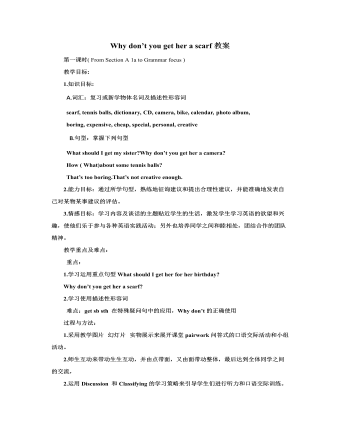
人教版新目标初中英语八年级下册Why don’t you get her a scarf教案
教师带领学生复习有关描述宠物的词汇,采用教师提问学生回答的方进行。如:T:What animals do you think would be good pets?What animals do you think would be bad pets?What do you think are good animals for a six-year-old child?然后学生进行 pairwork 练习。Task two: 师生互动,学习探究 1、播放3a部分的录音,引导学生一边听录音,一边跟读。2、通过听录音学生回答以下问题:Why do you think pot-bellied pigs are popular?What are the advantages and disadvantages of keeping such a pet?教师对学生的回答进行及时点评。3.学习范文,学习重点短语,为下步的模仿写作提供语言素材。T :1. )Have you ever kept a pig as a pet?Do you like pigs? St.:No.…Why don’t you like to keep a pig? St: No.They’re too dirty and lazy(Do you know in some foreign countries like Hollyland, Australia,pigs are the most popular pet.there’s a kind of pig.(图)it has an interesting name? it ‘s called a pot-bellied pig.) Now,let’s learn an article about this kind of interesting pet.2.)play the tapeSt.:Listen and repeat3.)show some Qs on computer(本子St.: read silently,then answerthe Qs(本子)4.)Ask ss. Close book and retell this passage.(what is a pot-bellied pig? Is it a good or bad pet? ) St.: retell it to each other“A pot –bellied pig is a popular pet now…”5.read the article together.St.:.practice reading
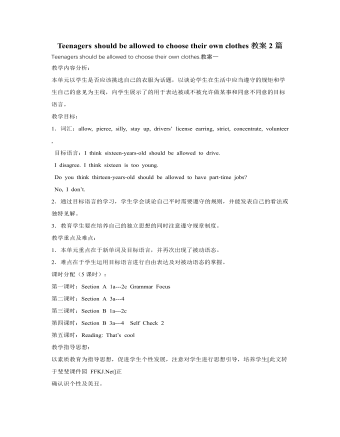
人教版新目标初中英语九年级上册Teenagers should be allowed to choose their own clothes教案2篇
Step 1 Greeting Greet the class and check the homeworkStep 2 A duty report The S on duty gives a report on the rules in his home and lead in 3a “Sun Fei’s and Wu Yu’s rules” Step 3 ReadingSs read the conversation and write the two girls’ rules in the chart. Check the answers.Get Ss to read after the tape and then read aloud by themselves. Then, T explains the language points.Step 4 Pairwork 3bRole play. Use the information in chart to practice with the conversation in 3a covered. They can look at the sample conversation in the right box.Step 5 Task 2 “Who’s the best reporter?”Make a survey by asking any 5 students the questions in the chart in activity 4. Then give out a report about it. See who is the best reporter? And the best reporter will get a nice ball-pen.Step 6 Summary and homework:Write out the report in your exercise-books.Period ThreeStep 1 Greeting and a duty reportThe S gives a duty report talking about his experience of being late for school. Lead in the question “Do you ever get to school late? How often do you get to school late? Always, usually, sometimes, or never?Step 2 1a Get Ss to finish writing.Step 3 Pairwork 1b Get Ss to talk about their answers with their partners using the sample conversation in the box on the right.Step 4 Listening practice2a Lead-in: What will happen if you get to school late? What about Peter? Let’s listen to a conversation between Peter and his father. Get Ss to finish 2a (As usual, for the first time, Ss only listen.) Check the answers.
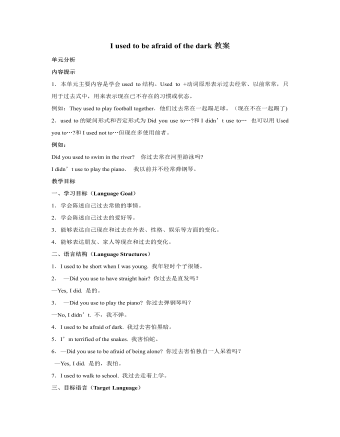
人教版新目标初中英语九年级上册I used to be afraid of the dark教案
内容提示1.本单元主要内容是学会used to结构。Used to +动词原形表示过去经常、以前常常,只用于过去式中,用来表示现在已不存在的习惯或状态。例如:They used to play football together.他们过去常在一起蹋足球。(现在不在一起踢了)2.used to的疑问形式和否定形式为Did you use to…?和I didn’t use to… 也可以用Used you to…?和I used not to…但现在多使用前者。例如:Did you used to swim in the river? 你过去常在河里游泳吗?I didn’t use to play the piano. 我以前并不经常弹钢琴。教学目标一、学习目标(Language Goal) 1.学会陈述自己过去常做的事情。2.学会陈述自己过去的爱好等。3.能够表达自己现在和过去在外表、性格、娱乐等方面的变化。4.能够表达朋友、家人等现在和过去的变化。二、语言结构(Language Structures) 1.I used to be short when I was young. 我年轻时个子很矮。 2. —Did you use to have straight hair? 你过去是直发吗?—Yes, I did. 是的。 3. —Did you use to play the piano? 你过去弹钢琴吗?—No, I didn’t. 不,我不弹。 4.I used to be afraid of dark. 我过去害怕黑暗。 5.I’m terrified of the snakes. 我害怕蛇。
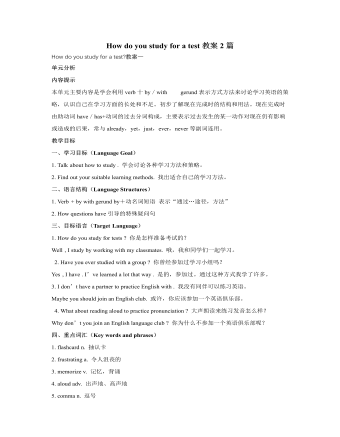
人教版新目标初中英语九年级上册How do you study for a test教案2篇
内容提示本单元主要内容是学会利用verb十by/with gerund表示方式方法来讨论学习英语的策略,认识自己在学习方面的长处和不足。初步了解现在完成时的结构和用法。现在完成时由助动词have/has+动词的过去分词构成,主要表示过去发生的某一动作对现在仍有影响或造成的后果,常与already,yet,just,ever,never等副词连用。教学目标一、学习目标(Language Goal) 1. Talk about how to study . 学会讨论各种学习方法和策略。2. Find out your suitable learning methods. 找出适合自己的学习方法。 二、语言结构(Language Structures) 1. Verb + by with gerund by+动名词短语 表示“通过…途径,方法” 2. How questions have引导的特殊疑问句 三、目标语言(Target Language) 1. How do you study for tests ? 你是怎样准备考试的?Well , I study by working with my classmates. 哦,我和同学们一起学习。2. Have you ever studied with a group ? 你曾经参加过学习小组吗?Yes , I have . I’ve learned a lot that way . 是的,参加过。通过这种方式我学了许多。
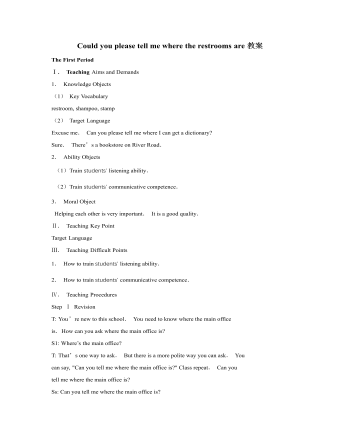
人教版新目标初中英语九年级下册Could you please tell me where the restrooms are教案
Step Ⅰ RevisionCheck homework. Ask a few students to read the article in 3a.Then ask a few students to read their guides.Step Ⅱ Part 1Look at the words in the box. Ask a student to read them. Make sure the students understand the meaning of the words. You are to fill in the blanks with the words. In some cases, students may need to use another form of the word, for example adjusting for tense or subject/ verb agreement.Ask students to fill in the blanks on their own.Check the answers. Step ⅢPart 2Go through the instructions with the class.Look at the example with the students.Ask students what the answer would be.Ask a student to read the question and answer it.Excuse me, could you tell me where the bank is, please?The bank is across the street from the shopping malt.Get students to complete the work in pairs.Check the answers. Ask a few students to read their questions.Step Ⅳ Just for Fun!Ask all the students to read the conversation. Ask: What is funny about this cartoon? Help students to explain. A Martian is a person from the planet Mars.There is no such thing as Martian food on Earth, and the clerk looks silly because he is trying to think of where there is a Martian restaurant.Invite some pairs of students to present this conversation to the rest of the class.Step Ⅴ Summary and HomeworkIn this class, we’ve done much writing practice using the key vocabulary words and the target language presented in this unit. After class, please finish the questions in 2 in your exercise books. Then finish the exercises on pages 47~48 of the workbook as well.The Seventh Period Ⅰ Teaching Aims and Demands1. Knowledge Objects(1) Key Vocabularyimage, adventure, jealousy, hero, crime, journey, brave, no longer, show interest in, take it easy, become interested in, plain looks(2)Text:Grown-ups like cartoons, too.2. Ability Objects(1) Fast-reading to get a general idea of the text.(2) Careful-reading to get the detailed information in the text.
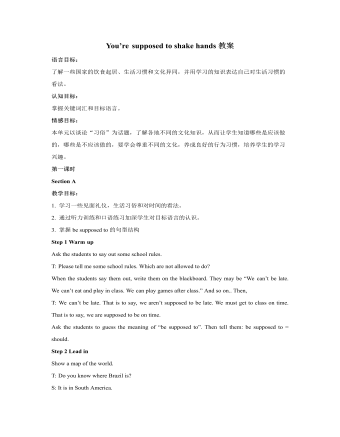
人教版新目标初中英语九年级下册You’re supposed to shake hands教案
教学目标:1. 掌握本单元一些重点词汇的写法和用法。2. 学会自如谈论餐桌礼仪。Step 1 RevisionAsk some students to retell the customs at the table in France in the passage in 3a.Step 2 Self checkPart 1. Fill in each bland with the correct word given. Students do the exercises by themselves at first. Then check the answers. Ask the students to comprehend the sentences and help them point out uses of some words, like “arrive (at / in) sw., spend time / money on sth , spend time / money (in) doing sth.”Part 2. Read about Fan Ling’s experience in a western restaurant. Understand the passage. Point out some key points in the passage.1. be / get used to doing sth. 习惯做某事2. begin with = start with 以….开头3. crowd v. 挤满,塞满 the crowd 人群 crowded adj. 拥挤的Then students discuss about how she would solve her problem. Ask some to share their stories with others.Part 3. Complete the crossword by looking at the sentences on the left. Then check the answers.
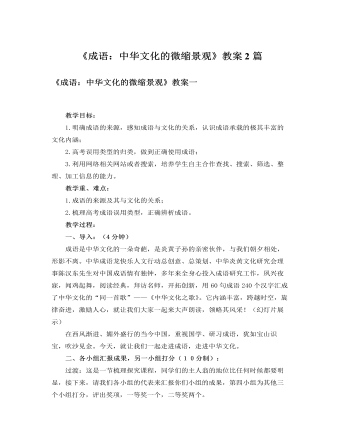
人教版高中语文必修2《成语:中华文化的微缩景观》教案2篇
七、教学反思这堂课有眼下看得见的效果和暂时看不见的长远的效果,学生收益明显:1.学生学到的不只是成语本身。学生从网络上搜集材料,分析整理,不只是学成语,探究能力也得到提高。对成语的梳理探究,是让学生做一件很具体的事——梳理、分析、归类。重在过程,重在课外、课前学生的工作。这样的教学设计很有价值,让学生在活动中得到提高。2.开拓了学生的眼界。学生放眼各种报刊,从报刊中发现问题——大家都可能出错。这样一来学生的眼界变宽了,自信心增强了。3.对成语的理解、运用比过去深刻。让学生从对一个个具体成语的理解入手,进而认识到以后用成语不能犯“望文生义”等错误,从个例上升到一般。4.让学生知道以后自己运用成语应抱什么态度,用什么方法。别人错用成语,是前车之鉴。
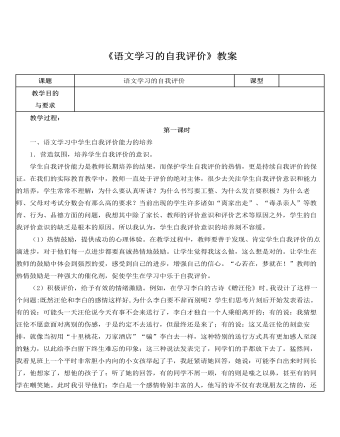
人教版高中语文必修3《语文学习的自我评价》教案
一、语文学习中学生自我评价能力的培养1.营造氛围,培养学生自我评价的意识。学生自我评价能力是教师长期培养的结果,而保护学生自我评价的热情,更是持续自我评价的保证。在我们的实际教育教学中,教师一直处于评价的绝对主体,很少去关注学生自我评价意识和能力的培养,学生常常不理解:为什么要认真听讲?为什么书写要工整、为什么发言要积极?为什么老师、父母对考试分数会有那么高的要求?当前出现的学生许多诸如“离家出走”、“毒杀亲人”等教育、行为、品德方面的问题,我想其中除了家长、教师的评价意识和评价艺术等原因之外,学生的自我评价意识的缺乏是根本的原因。所以我认为,学生自我评价意识的培养刻不容缓。(1)热情鼓励,提供成功的心理体验。在教学过程中,教师要善于发现、肯定学生自我评价的点滴进步,对于他们每一点进步都要真诚热情地鼓励。让学生觉得我这么做,这么想是对的。让学生在教师的鼓励中体会到强烈的爱,感受到自己的进步,增强自己的信心。“心若在,梦就在!”教师的热情鼓励是一种强大的催化剂,促使学生在学习中乐于自我评价。
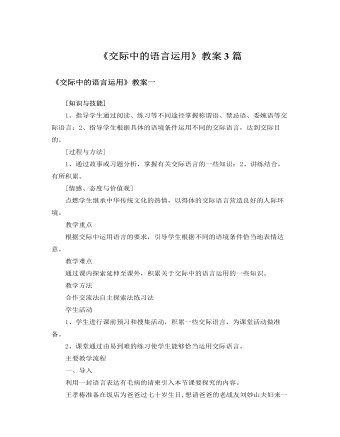
人教版高中语文必修3《交际中的语言运用》教案3篇
知识与技能1、指导学生初步掌握称谓语、禁忌语、委婉语等交际语言;2、指导学生根据具体的语境条件运用不同的交际语言,达到交际目的。过程与方法1、通过故事或习题分析,掌握有关交际语言的一些知识;2、讲练结合,有所积累。情感、态度与价值观点燃学生继承中华传统文化的热情,以得体的交际语言营造良好的人际环境。教学重点根据交际中运用语言的要求,引导学生根据不同的语境条件恰当地表情达意。教学难点通过课内探索延伸至课外,积累关于交际中的语言运用的一些知识。教学课时:一课时教学过程一、导入利用一道口语交际训练题引入本节课要探究的内容。例1:下面的场合,如果班长既想达到批评的目的,又想把话说得委婉些,表达恰当的一项是(C)小李和小杨,为了一点小事,两人自习课上大声地争吵起来。这时,班长说:A、你们这样大声争吵,影响很坏。B、你们这样大声争吵,难道不感到羞耻吧?
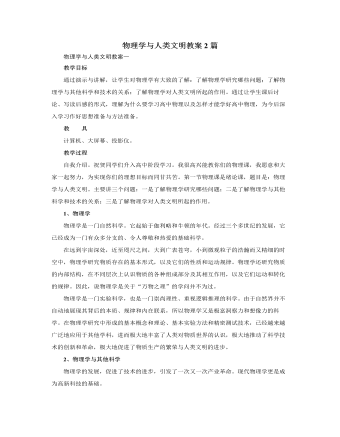
人教版新课标高中物理必修1物理学与人类文明教案2篇
八、物理学的基础地位及物理学对人类文明、社会进步的影响。(1) 情景一:磁悬浮实验:找两个空心的圆柱片磁铁,同名磁极相对,穿在同一根竹筷上,用手压下上面的磁铁,松手观察它的运动情况。问题1:上面的磁铁为什么会跳起来,为什么会悬浮在下面的磁铁上方?问题2:根据这个实验,你会想到那一种交通工具?总结:人们就是从磁悬浮现象中得到启发,进行磁悬浮列车的研究和制造的,这说明物理学在推动社会进步、人类文明方面起到推动作用。(2) 情景二:感应起电和火花放电实验:用感应起电机或感应圈产生火花放电,让学生观察现象,闻气味,然后联想生活实例。还可以用一张纸试着挡住放电的弧光,最好能引燃纸张,说明雷击引起火灾的现象。问题1:你看、听到了什么现象?问题2:根据这个实验,你会想到那一种自然现象?问题3:放电发生在什么地方?为什么建筑物上方都有尖尖的设置,是干什么用的?问题4:你闻到什么气味了吗?
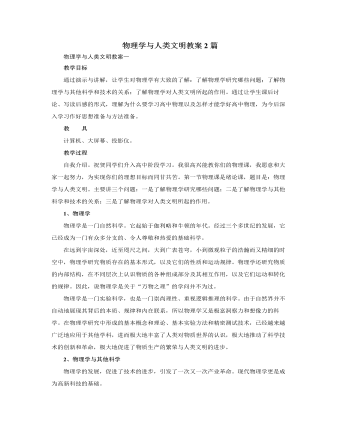
人教版新课标高中物理必修1物理学与人类文明教案2篇
1. 课前观看视频《物理学与人类文明》2. 分组讨论,派代表发言,谈学习感受。主要是物理的地位,物理的学习方法。3. 高中物理与初中物理在内容和方法上的区别高中物理除了现象、概念和规律之外还应该关注研究问题的方法,学会从先想到抽象,从定性到定量研究问题,学会用数学方法解决物理问题,学会实验探究,学会独立分析问题解决问题的思维习惯。4. 高中物理学习的基本要求高中物理学习应该“重视实验,勤于思考”和“经历过程,体验方法”。高中物理学习与初中物理学习虽然有一定区别,但也不是孤立的,要继续坚持初中物理学习中积累的学习方法和体会,重视从正反两个方面加以总结和提炼,做到:(1) 认真阅读,学会自学要学好物理,就要认真阅读课本。阅读课本是要抓住关键词语,弄清语句间的逻辑顺序和因果关系,领会文章段落所表达的物理内容,掌握课本叙述物理问题的表达方法。
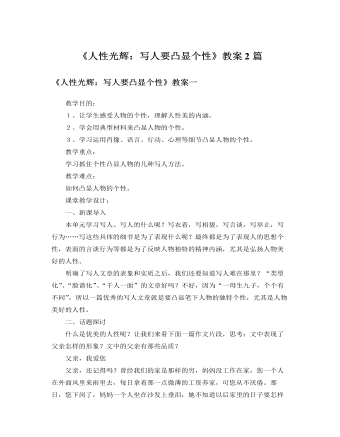
人教版高中语文必修1《人性光辉:写人要凸显个性》教案2篇
(学生展开畅叙所谈,言之有理即可。)归纳:以上因素在人物语言表达中是综合体现的,所以在写作时必须周密思考,使人物语言体现的人物性格更丰富,更有立体感。(3)行动描写矛盾先生曾说:“人物性格必须通过行动来表现。”我们在写作文时,应当注意描写最能揭示人物本身的独特性格的,最合乎人物地位,身份的动作,从而使人物形象更生动。行动描写要注意哪些方面?A、选择具有代表性,最能表现人物性格的行动来写。如《守财奴》中的老葛朗台的性格特点。B、要善于选择具有表现力的动词,把人物的行动准确传神地描写出来。(4)侧面描写写作不仅可以从正面对人物加以刻画,也可以通过周围各种不同人物的眼看,嘴讲等方式,从侧面起到烘托某个特定人物的作用。(请学生欣赏片段《茶花女》,《红楼梦》,教师归纳。)
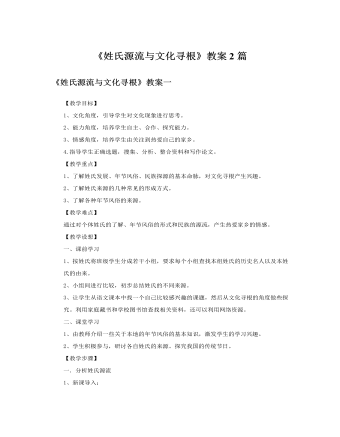
人教版高中语文必修2《姓氏源流与文化寻根》教案2篇
据此,研究者认为我国的姓源于原始社会母系氏族时期,并作为一个血缘家族的称号。氏隶属于姓。夏、商、周时期,姓氏作为贵族间区别不同血缘关系的一种制度。自秦汉以后,姓氏不分,合二而一。3、大家有没有听说过《水浒传》中一个人物“西门庆”,他姓西门,为什么姓西门呢?他家住在西门这个地方。大家想想东郭先生为何姓东郭?可见有按居住地而得姓。4、现在如果赋予同学们一个神圣的职责,让你们给一个人赐姓,这个人是杀猪杀鸡杀鸭的,你们觉得要给他一个什么样的姓才合适呢?(自由讨论,姓“屠”)明确:这就是姓氏来源的又一种方法,按照职业取姓。大家想一想有没有其他按照职业得姓的姓氏?(巫、卜、陶等)5、大家通过预习有没有发现其他获得姓氏的方法。(国名、自己祖先的字等。)姓在母系氏族社会以后,逐渐增多,来源极广。主要来源于封国名、谥号、爵位名、官名、居地、职业等。
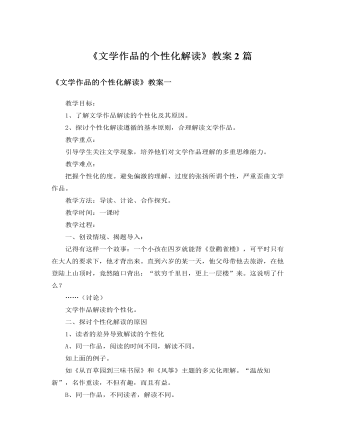
人教版高中语文必修3《文学作品的个性化解读》教案2篇
教学目标:1、了解文学作品解读的个性化及其原因。2、探讨个性化解读遵循的基本原则,合理解读文学作品。教学重点:引导学生关注文学现象,培养他们对文学作品理解的多重思维能力。教学难点:把握个性化的度。避免偏激的理解、过度的张扬所谓个性,严重歪曲文学作品。教学方法:导读、计论、合作探究。教学时间:一课时教学过程:一、创设情境、揭题导入:记得有这样一个故事:一个小孩在四岁就能背《登鹳雀楼》,可平时只有在大人的要求下,他才背出来。直到六岁的某一天,他父母带他去旅游,在他登陆上山顶时,竟然随口背出:“欲穷千里目,更上一层楼”来。这说明了什么?……(讨论)文学作品解读的个性化。二、探讨个性化解读的原因1、读者的差异导致解读的个性化A、同一作品,阅读的时间不同,解读不同。如上面的例子。如《从百草园到三味书屋》和《风筝》主题的多元化理解。“温故知新”,名作重读,不但有趣,而且有益。B、同一作品,不同读者,解读不同。





















